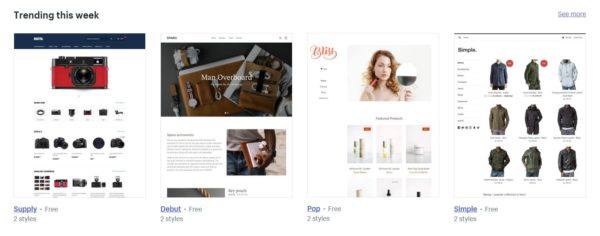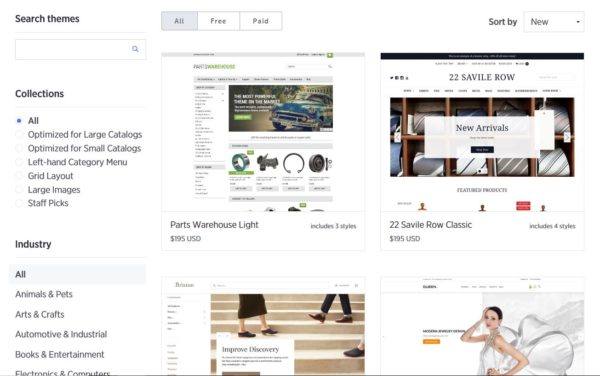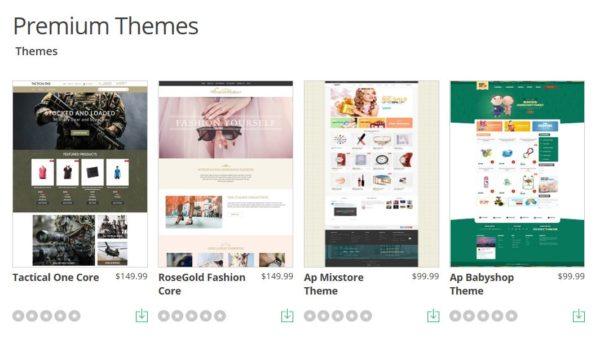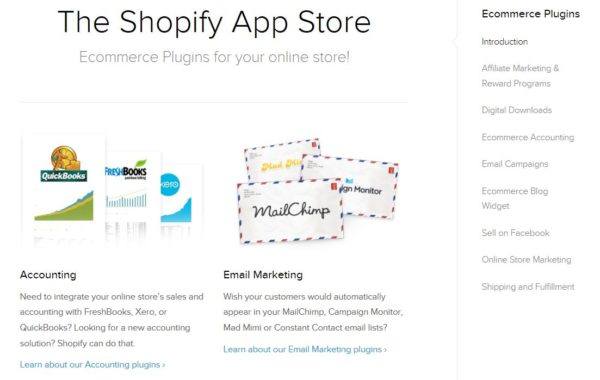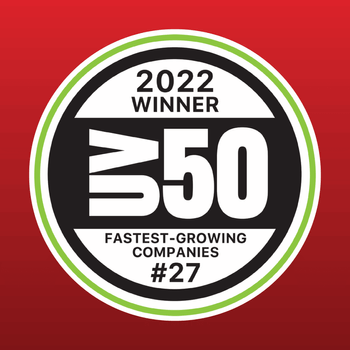by Aden Andrus • February 1, 2018
Comparing Ecommerce Platforms: Which One is Right for You?
Ecommerce is the fastest growing retail market in the US. In fact, roughly 15% of US retail sales took place online in 2017!
As you can probably imagine, a lot of people are excited to get in on the action, but running an effective ecommerce business (or branch of your business) isn’t as simple as picking a product and posting some ads.
To really succeed at ecommerce, you need to pick the right ecommerce platform.
The good news is, there are a lot of ecommerce platforms out there. The bad news is, lots of options can make it hard to figure out which platform is right for your needs. If you are in the middle of picking an ecommerce platform, you’ve probably seen firsthand how many different features you have to choose from.
Even in a blog post like this, comparing and thoroughly evaluating every ecommerce option out there would be overwhelming and frankly not very helpful. So, in this article, I’m going to focus on 5 of the most popular ecommerce platforms: Shopify, 3dcart, Bigcommerce, Volusion and Big Cartel.
However, since I’m well aware that these “Big 5” aren’t the only options out there, we’ll take a look at how these ecommerce platforms measure up in 5 areas that matter to you as a potential customer: pricing, ease of use, templates, plug-ins and customer support. That way, even if a platform we don’t discuss catches your eye, you’ll have a good framework to evaluate them.
1. Ecommerce Platforms: Pricing
If you’re like me, when you think about picking an ecommerce platform, the first thing you think is, “How much is this going to cost me?” After all, many ecommerce businesses take a little while to start producing meaningful profit and it can be a bit scary to spend a lot of money on an ecommerce platform with no assurance of revenue.
With that in mind, let’s take a look at the relative prices of these platforms:
| Ecommerce Platform | Cheapest | Middle | Most Expensive |
|---|---|---|---|
| Big Cartel | $0/mo | $19.99/mo | $29.99/mo |
| Volusion | $15/mo | $35/mo | $135/mo |
| Shopify | $29/mo | $79/mo | $299/mo |
| 3dcart | $29/mo | $79/mo | $229/mo |
| Bigcommerce | $29.95/mo | $79.95/mo | $900+/mo |
As you can see, Big Cartel is hands down the cheapest option on our list, especially for someone who is just getting started. Even their most expensive option is the same price as Shopify’s mid-tier option.
While it’s hard to say “no” to free, pricing isn’t the only factor to consider (otherwise, this article would be over). If you’re going to put a lot of time and effort into creating a profitable ecommerce store, picking a platform that will meet your long-term needs is probably more important than picking the cheapest platform.
For example, if you think your store is going to scale up quickly, Shopify is a great platform to consider. It scales incredibly well and can handle the demands of large amounts of traffic with ease. If your store takes off, you’ll be grateful that you decided to start with a $9/month platform instead of a free one.
Despite my frugal nature, I recommend choosing your ecommerce platform based on what your needs (and anticipated needs) are, rather than how much the platform costs. In the long run, picking the right platform will be worth a lot more than saving a few dollars (or even a few hundred dollars).
2. Ecommerce Platforms: Ease of Use
If you’re new to ecommerce, ease of use is probably a big priority. Features are great, but all the features and customizability in the world won’t mean much if you don’t have the knowledge and expertise to use them.
Fortunately, all 5 of the ecommerce platforms we are discussing in this article are fairly easy to use and they all come with a setup wizard that will walk you through the process of setting up your store. However, creating your first store isn’t the only ease of use factor to consider.
Once your store is set up, there’s a lot to stay on top of or optimize. How an ecommerce platform manages your inventory and the design functionality options it offers all play a role in how easy a platform is to use in the long run.
Shopify
Shopify makes setup incredibly easy. It has a very straightforward dashboard for adding products, customizing your site design and more. If you happen to be switching from another platform to Shopify, Shopify has a slick import option as well.
After your store is set up, Shopify also makes it easy to add additional products, including titles, descriptions, price and several other handy fields. Regardless of what you are specifically trying to do, Shopify has handy tips all over the place, making it the most user friendly platform on this list, in my opinion.
Volusion
Like Shopify, Volusion makes it easy to set up your store. Although it’s not quite as attractive as Shopify’s dashboard, Volusion’s store creation process isn’t hard to follow, so you can quickly get up and running.
Adding products afterwards is also a simple affair, but things do get more complicated if you want to change how your site looks after the initial setup process. At this point, you basically need to know how to code to change anything, which isn’t great since your first design is rarely perfect.
Big Cartel
Compared to the other 4 ecommerce platforms on this list, Big Cartel’s startup process is a nightmare…but that’s only because the other platforms have done such a good job of making their startup process easy and intuitive.
Long term, Big Cartel doesn’t shine in the “ease of use” category, either (I guess you get what you pay for, right?). It doesn’t have a drag-and-drop editor and it doesn’t give you a ton of built-in customization options. If you want to make your Big Cartel store your own, expect to do some coding.
Bigcommerce
In terms of how easy it is to get your store set up, Bigcommerce’s incredibly clean and clear dashboard is neck-and-neck with Shopify’s. In fact, if you don’t care about customizing anything, you can get your store up and running in a matter of minutes with Bigcommerce.
If you are interested in customizing your store design, however, Bigcommerce isn’t quite as user friendly as some of the other options on this list. While Bigcommerce does have some nice design features, it doesn’t offer a drag-and-drop editor and you may find that you need coding expertise to get what you’re really looking for from the platform.
3dcart
Setting up a store with 3dcart isn’t quite as straightforward as setting up a store with Shopify or Volusion, but that’s primarily because 3dcart offers a ton of features you can use to customize your store.
If all those features sound a bit intimidating, don’t worry, 3dcart has tons of tutorials you can use to get the most out of the platform and a clean wizard that offers a setup process that is about as easy as Shopify’s.
Unlike some of its competitors, 3dcart does not have a drag-and-drop visual editor, but it does at least have a limited visual editor you can use to edit your site—even if your CSS or HTML kung fu is weak. This is great for people who are new to ecommerce, since you can customize your store without having to hire a developer.
Of course, for full customizability, you’ll want to learn a little coding (or pay someone to do it for you), but 3dcart offers plenty of customization options for even the coding clueless, which makes it one of my favorite ecommerce platforms in terms of usability.
3. Ecommerce Platforms: Templates
A new visitor to your ecommerce store forms an opinion about your brand within 0.2 seconds. What produces that opinion? It’s not your product, price or copy—it’s your site design.
People instinctively distrust poorly designed websites, so if your store doesn’t look good, it may be hard to bring in sales. Unfortunately, not everyone is a natural artist and hiring a designer to compensate for your creative shortcomings can be expensive.
This is where templates come in handy.
All of the ecommerce platforms on this list offer at least a few design templates you can use to give your store a polished, professional look, but there are a couple of platforms that really stand out in this area: Shopify and Bigcommerce.
Shopify offers dozens of beautiful and functional themes (aka, templates) for you to choose from. Some of these are free and some cost $140-180.
Similarly, Bigcommerce offers dozens of its own paid and free themes on its theme store:
Historically, 3dcart didn’t have a lot of themes and the ones they did have looked quite dated. Now, however, 3dcart offers just as many free and paid themes as Shopify or Bigcommerce. The themes might not be quite as polished as the ones on Shopify or Bigcommerce, but with how easy it is to customize your design on 3dcart, that’s an easy problem to fix.
All of 3dcart, Bigcommerce and Shopify’s themes are beautifully designed and do a good job of convincing potential customers to buy. In addition, with all of these templates at your fingertips, these ecommerce platforms make it easy to give your store a unique look and feel that sets it apart from the competition.
By comparison, Big Cartel and Volusion don’t offer much in the way of templates. They only offer a few themes and those themes are incredibly basic. Combine that with how difficult it is to customize your design on these platforms and you may need to pay a designer and a developer to get the kind of design you need.
4. Ecommerce Platforms: Plug-Ins
Another factor to consider when picking an ecommerce platform is the plug-in options they offer. While it would be nice if every ecommerce platform offered every possible app and add-on you could need, different businesses need different plug-ins, so most platforms don’t make every plug-in part of their standard package.
The good news is, even you’re not a developer, plug-ins give you the ability to customize the functionality of your store.
Some plug-ins give you options like a “free shipping” bar or coupon pop-ups that help improve your user experience (and their odds of making a purchase). Others give you additional options on the back-end of your store, like checking to see if your pages are optimized for search engines.
Generally speaking, Shopify and Bigcommerce offer the widest range of plugins from both the platform itself and third-party companies. Both of these ecommerce platforms have a robust user base, which means that there are a ton of developers who have created niche plug-ins that could be perfect for your needs.
3dcart also has a number of plug-ins, but they don’t have as many and it can be harder to find them.
Big Cartel and Volusion again come up short in this department. Volusion only offers one app and Big Cartel doesn’t offer any. Again, while these platforms can be great if you have the expertise on hand to develop your own custom plug-ins, without a developer it may hard to customize your store.
5. Ecommerce Platforms: Customer Support
Finally, one thing many aspiring ecommerce business owners fail to consider is the customer service options that come with their chosen platform. Let’s be real, if you’re creating your own store, tutorials and guides can only get you so far—from time-to-time, you’re probably going to need to talk to a human.
Here, Shopify and 3dcart are the clear winners. Both of these ecommerce platforms offer 24/7 phone, chat and email support.
Bigcommerce and Volusion, by comparison, offer 24/7 email and chat support, but may not always be available for phone support. But, if you’re like me and prefer typing to talking, that may not be a problem.
Unfortunately, Big Cartel comes in last place with regards to the accessibility of their customer service department. As long as nothing bad happens at night and you’re okay with waiting for them to respond via email, everything should be okay…but if you have a critical problem outside of normal business hours, you’re on your own.
Of course, all of these ecommerce platforms have a knowledge base that should cover the majority of issues you could potentially run into. This is particularly true for Shopify and BigCommerce, which have the largest user base and thus the most forum activity and user-generated content.
Honestly, for most problems, it’s easiest to use the platform’s existing knowledge base, but for those times when you can’t find a solution online, good customer service can be a lifesaver.
Conclusion
At the end of the day, the “right” ecommerce platform is the one with the pricing, features and customizability that you need. Hopefully, this article has helped you compare some of the bigger ecommerce platforms and think through what you want from your ecommerce platform.
If you still have questions, though, or want help optimizing your ecommerce site, let me know here or in the comments. I’d love to help!
Have you tried any of these ecommerce platforms? What was your experience like? What recommendations would you make to someone who is trying to pick an ecommerce platform? Leave your thoughts in the comments below.


